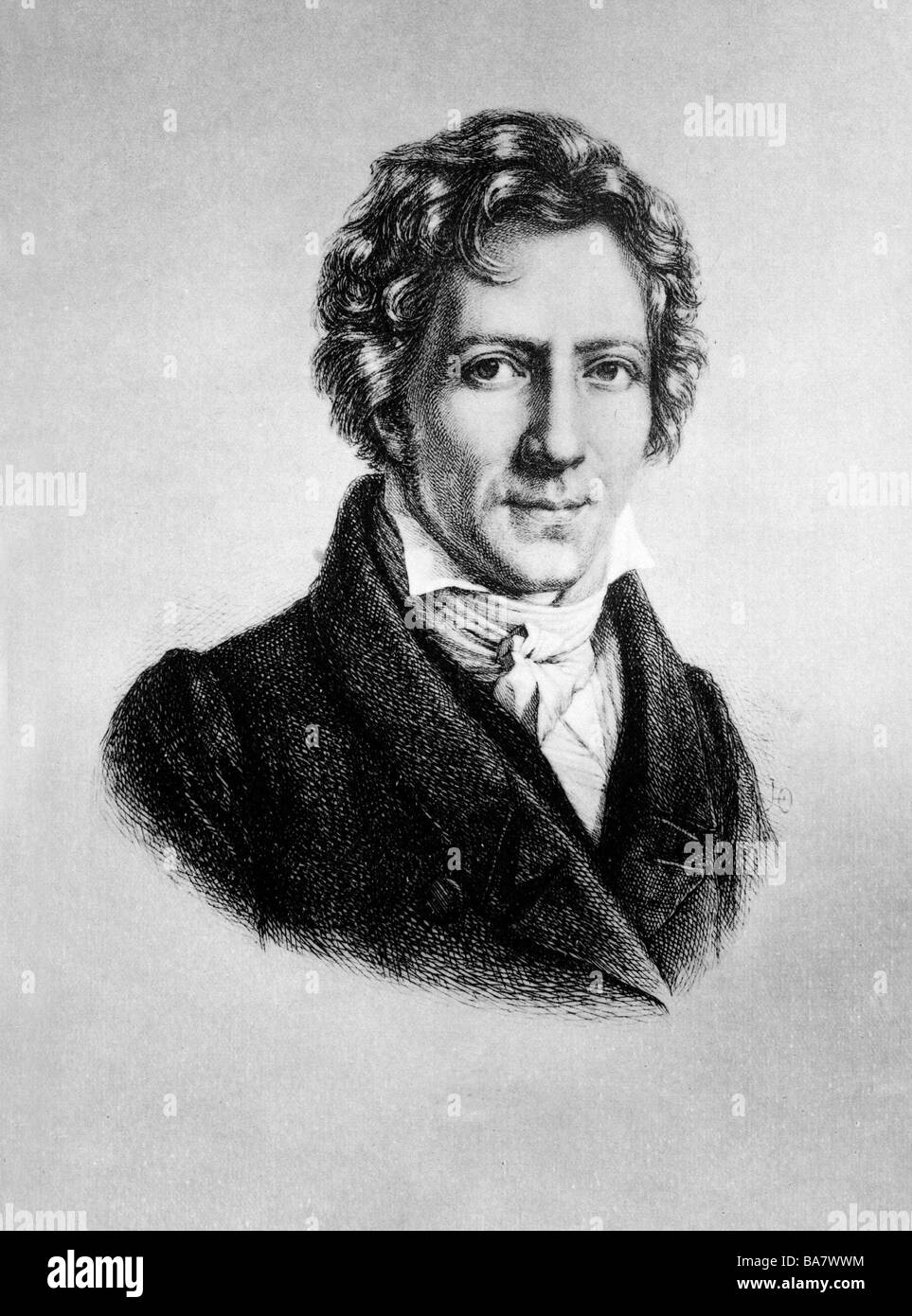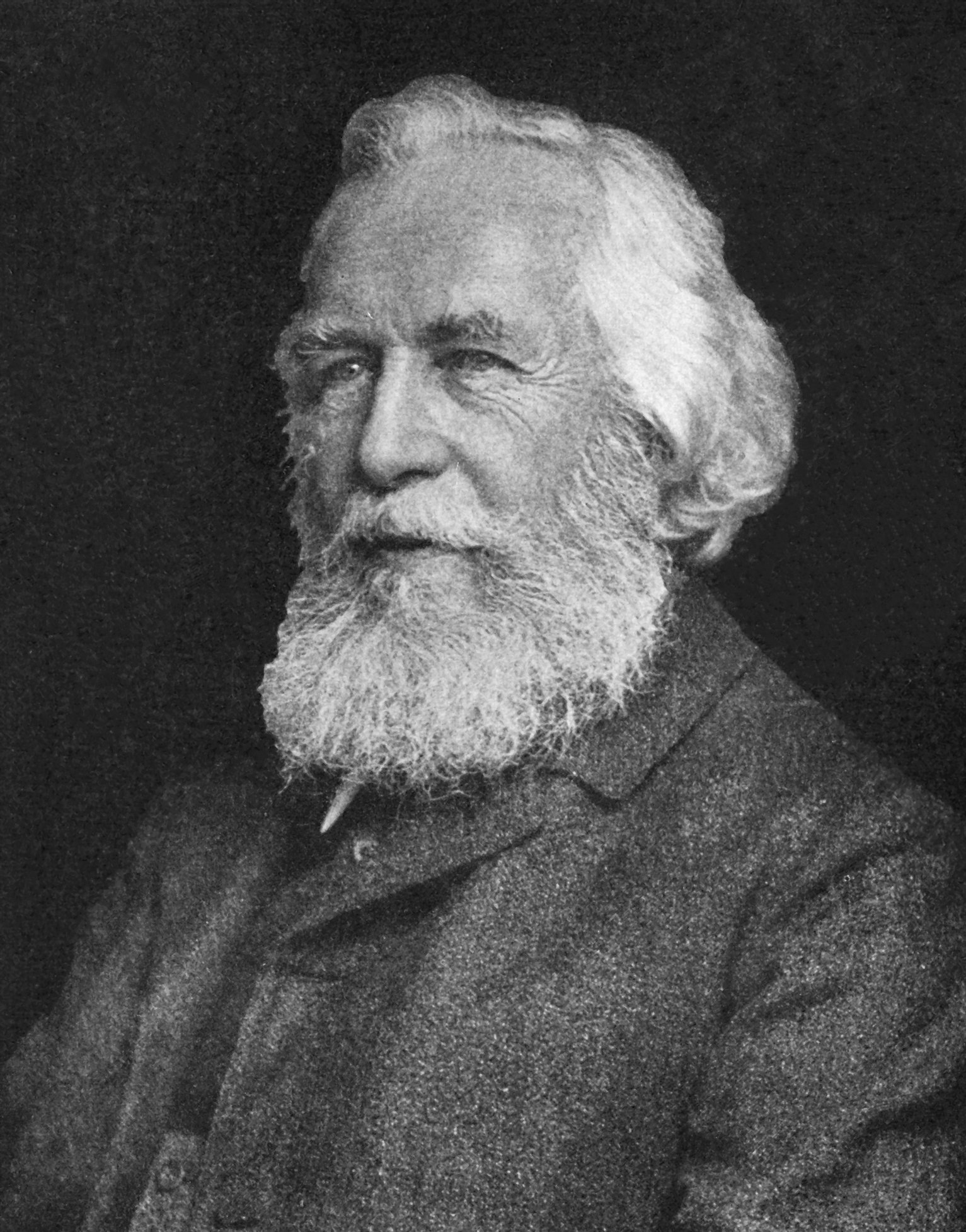Philipp August Böckh
August Boeckh (often Böckh, * November 24, 1785 in Karlsruhe, † August 3, 1867 in Berlin) was a German classical scholar and antiquary.
Life
August Boeckh was the youngest of six children. His father, Georg Matthäus Boeckh, served as Councilor and Secretary imperial notary official in margravial services. His brother Christian Friedrich von Boeckh pursued a civil service career and was Baden Finance (1828 ) and Prime Minister (1844 ). His uncle was the theologian and writer Christian Gottfried Boeckh. 1790, just five years after Boeckh birth, his father died.
After Boeckh had in Karlsruhe, the classical language high school that should be in his opinion, the only access to the university and the classical studies later visits, he studied from 1803 in Halle on one of the leading universities at that time theology. But under the influence of classical philologist Friedrich August Wolf, he broke off his studies in theology and began to study philology. Here, he obtained his doctorate in 1806 with the treatise on ancient music Commentatio in Platonis qui vulgo Fertur Minoem and was built in 1806 by Friedrich Schleiermacher 's educational seminar in Berlin.
In 1807 he was habilitated at the University of Heidelberg and immediately appointed extraordinary professor of philology. Two years later he was promoted to full professor. In the same year he married Dorothea Wagemann ( 1790-1829 ). After her death he married in 1830 Anna Louisa Dove ( 1790-1864 ).
To Boeckh 1809 accepted a call to Berlin, which he followed in 1811 and should determine the rest of his life. Next to him were, inter alia, Christoph William hoof, Carl Ritter, Friedrich Carl von Savigny and Albrecht Daniel Thaer of the first professors at the University of Berlin founded in 1810. August Boeckh held here more than 120 semester long lectures without interruption, was six times Dean and exercised five times was the rector of. In 1814 he founded the Philological Seminar. In the same year he became a full member of the Royal Prussian Academy of Sciences, which should also supervise major projects in his opinion.
In 1815 he initiated the " Corpus Inscriptionum Graecarum " ( CIG ), which launched the scientifically operated epigraphy. Herein he sighted in the shortest time available to date Greek inscriptions and arranged them according to landscapes. After 1825 the first issue of the CIG appeared ( to 1859 were Boeckh 4 volumes published ), expressed the Leipzig philologist Johann Gottfried Jakob Hermann its criticism. However, Boeckh worked at his collection of Greek inscriptions only copies and did not consider it necessary to consider the inscriptions themselves or by them to create accurate illustrations.
In addition to the interest in theology and philology to Boeckh also dealt with " the exact science areas." So also Boeckh dealt because next work "The State House attitude of Athens " with the " exploration of prices, wages, interest rates, income and expenses such as financial management Athens ". This opus he wrote to a suggestion of Barthold Georg Niebuhr, who had the chapter on the Greek state economy in the last volume of Arnold Hermann Ludwig Heeren's " ideas about politics, transport and trade of the principal nations of the old world " criticized, and others, as he originally wanted to portray a complete picture of Greek antiquity under the title " Hellen ", but could not due to lack of preliminary work in finance Athens.
Then in 1838, he published " Metrological investigations of weights, Münzfüsse and mass of antiquity in their context " in Berlin. In it, he was the first to an overview " About the measures in detail as well as their formation and linkage as a result of various economic and political developments in the Mediterranean " that here too based his work on inscriptions. Thus, it applies to Reinhard Schumacher as the founder of historical metrology. Important is his discovery of the difference between encountered and proposed conditions.
Between 1835 and 1861 he served as secretary of the philosophical- historical class of the Berlin Academy. The philosophical- historical class united mainly philosophers and historians of all persuasions, but also philologists, cultural and linguists, theologians, lawyers and economists, psychologists and sociologists.
His teacher FA Wolf had held since 1785 lectures under the title " Encyclopaedia philo logica " in Hall and published on this basis, the "Statement of Alterthumswissenschaft ". A similar over 26 lectures protracted introduction series was also Boeckh with the theme " Philological encyclopedia ". He established order in on Wolf, but also tried to highlight its changes to its model.
He died on August 3, 1867 in Berlin as one of the most celebrated scholars of his time.
Boeckh was the first who gave the higher conception of philology validity, after which the same in -depth knowledge and reproduction of antiquity is to consist in its entirety. One of his most prominent pupils was the future explorer and Geography Professor Heinrich Barth, who at Boeckh his doctorate in 1843 on the trade history of Corinth and three years later his habilitation with a thesis on the ancient Mediterranean as a cultural unit.
In 1842 the Order Pour le Mérite Boeckh was awarded for Sciences and Arts. In 1853 he was awarded the Bavarian Maximilian Order for Science and Art.
Memberships
Works
Major works
- The State House attitude of Athens, 2 vols, Berlin 1817 ( engl. v. George Cornewall Lewis, London 1828 2nd edition 1842 double v. A. Laligant, Paris 1828).
- Corpus Inscriptionum Graecarum, 2 vols, Berlin 1828-1843 (Vol. 3 and 4 by Johannes Franz, Ernst Curtius and Adolf Kirchhoff, index volume by Hermann Röhl ).
- Metrological studies on weights and dimensions Münzfuße of antiquity, Berlin 1838 ( abgedr. in: Housekeeping State of Athens, 2nd edition 1851-1852 ).
- Instruments on the sea creatures of the Athenian State, Berlin 1840 ( abgedr. in: Housekeeping State of Athens, 2nd edition 1851-1852 ).
- Encyclopedia and methodology of philological sciences, Leipzig: Teubner, 1877 (2nd edition 1886).
Translations / Editions
- (together with Georg Ludolf Dissen ) Pindari opera quae super sunt, 2 vols in 4 pts, Leipzig from 1811 to 1821.
- Sophocles' Antigone, Greek and German, Berlin 1843 (2nd edition Leipzig 1884).
Smaller fonts
The memoirs of the Berlin Academy, the dissertations of the Philological Society, and other journals contain rich essays by Boeckh. In addition, he has held a professorship of rhetoric at the University, as well as the first secretary of the Berlin Academy, a number of excellent speeches in Latin and German. These little writings were collected by Ferdinand Ascherson, Serious Bratuscheck and Paul Eichholtz published (Leipzig from 1858 to 1874, 7 vols ). Boeckh also has a major role in the new edition of the works of Frederick the Great. From the original stapling his 1809-1865 held lectures published Bratuscheck 1877, the " Encyclopaedia and Methodology of Philology ".
- Graecae tragoediae principum, Aeschyli, Sophoclis, Euripidis, num ea quae sunt et super omnia sint genuina, Heidelberg 1808.
- The versification of Pindar, Berlin, 1809.
- Philolaus the Pythagorean Philolaus teachings, together with the fragments of his work, Vossische bookstore, Berlin 1819 ( at the HU Berlin: Humboldt University of Berlin)
- Manetho and the dog-star period. A contribution to the history of the Pharaohs, Berlin 1845 ( first in: Journal of History, Vol 2, 1844, pp. 385-556 ).
- Studies of the cosmic system of Plato, Berlin, 1852.
- History of the Mondcyklen of the Hellenes, Leipzig 1855.
- Epigraphically - chronological studies. Second contribution to the history of Lunar cycles of the Hellenes, Leipzig 1856 ( = offprint from: Yearbooks for classische Philology, Supplement Volume 2, 1856-1857, pp. 1-176 ).
- Over the four-year sun circles the elderly, especially the Eudoxischen. A contribution to the history of computing time and drying of the calendar system of the ancient Egyptians, Greeks and Romans, Berlin, 1863.









